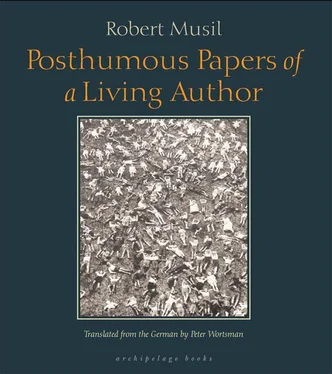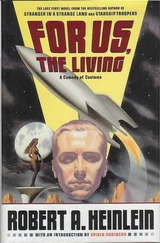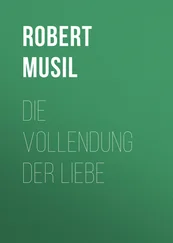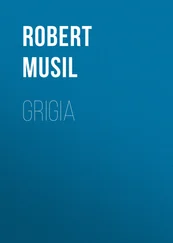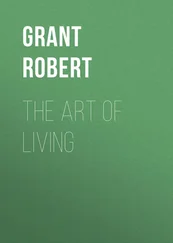In this way, people learn from time to time what kinds of poets there are, and there are always the greatest, the most important, the most genuine, the most recognized, and the most read. But what, without a superlative, a poet is, and when someone who simply writes is a poet, and not the “well-known author of. .,” — this question has been raised since time immemorial. The issue is clear, and yet the world is ashamed of asking such a question, as though it smacked of the archaic! Yet it will surely come to pass that you will be able to say with certainty what Kaffee Hag , a Rolls Royce, and a glider are, but will be at a loss, when your children’s children ask eagerly: “Great-grandpa, in your day you still had poets; what’s that?”
Perhaps you will try to convince them that poets were about as real as Hell. For we will say with the greatest conviction: “Aw, hell!” “Go to hell!” “Hell’s bells!” “Come hell or high water!” and the like, without really believing in Hell. It’s just a question of the life of a language, and no insurance company would put the smallest premium on the life of the German language. But this argument can easily be rebutted. For however insignificant a role the word “poet” may play in the intellectual history of our time, future generations will find its unexpected, albeit inextinguishable, traces in our economic history! Consider how many people nowadays live off the word poet — the number is almost infinite, even if we completely ignore the wondrous lie claimed by the state, that its sole purpose is the cultivation of the arts and sciences. We might begin by counting the literary professorships and seminars, and proceed to include the entire university structure with its bursars, proctors, secretaries, and others involved in its administration. Or else we can begin with the publishers, and then move on to the publishing concerns with their employees, the agents, the retail booksellers, the printers, the paper and press manufacturers, the trains, the post office, the tax collection office, the newspapers, the ministerial department heads, the superintendents — in short, with enough patience, anyone could spend an entire day calculating the web of these connections. What will always remain a constant is the fact that all of these thousands of people live — some well, some badly, some completely, some in part — off the existence of poets: although no one knows what a poet is, no one can say for certain that he has ever seen a poet, and all of the prize competitions, academies, honors, honoraria, and distributions of honorific titles cannot give any assurance that you can find a living example.
I would estimate that in the whole world today no more than a few dozen of them are still to be found. It is uncertain whether they can live off the fact that we live off of them: Some will succeed at this, others will not — it is an open-ended issue. If we wanted to cite a similar situation for comparison’s sake, we might say that countless people live off the fact that there are chickens, or that there are fish; yet the fish and chickens do not live from this, but rather die from it. In fact, we might add that even our chickens and fish live for a short while off the fact that they must die. But this entire comparison proves untenable when we consider that at least we know what these creatures are, that they actually exist and that they constitute no disruption to the fish- and chicken-breeding industry, whereas the poet, quite the contrary, constitutes a definite disturbance to the businesses built up around his handiwork. If he has money or luck, no one will bother too much over him; but as soon as he makes so bold, lacking the two aforementioned commodities, as to claim his birthright, wherever he happens to come from, he necessarily resembles a ghost who has the gall to remind us of a loan granted to our forefathers at the time of the ancient Greeks.
After a few trivial idealistic protestations by the publishers, he would be asked whether he believed he could produce a piece of literature that could guarantee a minimum sales run of thirty thousand copies; and the editors would recommend that he write short stories, which, however, would have to conform, as is only natural, to the needs of a newspaper. He, however, would necessarily reply that he could not consent to such terms; and he could likewise expect to arouse an equally legitimate displeasure at stage guilds, literary councils, and other cultural organizations. For everyone means well by him, and considering the fact that he can neither write popular plays, best-selling novels nor movies, we are inclined to come to the dark conclusion that if we were to add up all the things that this man cannot do, all that might perhaps be left over would be the fact that he possesses an uncommon talent. This being the case, we cannot help him either, and we would have to be inhuman not to hold it against him, not to want to be free of him.
When on one occasion such a needy ghost scoured the Berlin literary depots, an adroit, young, smartly dressed penpusher who had mastered the most out-of-the-way means of making a living, and for that reason believed that he too had been through the treadmill, expressed this by bursting forth with the following impassioned statement: “My God, if I had as much talent as this jackass, what couldn’t I accomplish!” He was mistaken.
Surrounded by Poets and Thinkers
They say that books have no magnitude nowadays and that writers are no longer able to write lengthy works. This may undoubtedly be so; but, for once, why not look at it the other way around, and consider the possibility that the German reader no longer knows how to read? Does not the reader develop in ever greater measure, the longer the text, an as yet unexplained resistance (not to be confused with displeasure), particularly if the text is genuinely poetic? It is as though the portal through which the book must pass were pathologically chafed and had shut itself up tight. When faced with the task of reading a book, many people nowadays find themselves thrust into an unnatural frame of mind; they feel as though they were made to undergo a disagreeable operation in which they have no confidence.
If we search for the reason and listen in on conversations on the subject, we find that the reader — the good reader, who would not miss a single important book, and who is quick to name the geniuses of the day and age! — we find that even this reader will almost always faithlessly concede, as soon as he is confronted with strong opposition to his opinion, that in all seriousness his favored genius may in fact not be a genius at all, and that there are no real geniuses around these days. This discovery, however, is by no means restricted to the belles lettres. Medicine has faltered, mathematics is up in the clouds, philosophy has lost its sense of purpose: Everywhere you turn today, the layman has lost his respect for the expert. And since every expert is also a layman in hundreds of other fields, the result is a great profusion of serious misgivings.
It is of course difficult to say just exactly how great today’s poets, thinkers, and scientists really are; but that has nothing whatsoever to do with the subject of our deliberations, for, as we readily discover, this phenomenon resembles in its structure the well-known children’s card game, “Old Maid.” The poets do not after all find fault in themselves, but rather in the scientists, thinkers, technicians, and other luminaries; and the same is true for the others. In short, the bulk of this cultural pessimism that seems to oppress everyone is always shifted onto someone else’s shoulders; and plainly put, man as culture-consumer is, in an insidious way, dissatisfied with man as culture-producer. This claim, however, accords wonderfully well with its opposite; for just as you hear the complaint that true genius no longer exists, so you too might be inclined to remark in private that there is nothing but genius left. Just take a moment to leaf through the news and reviews in our magazines and newspapers, and you will truly be amazed at how many deeply moving, prophetic, greatest, deepest, and very great masters appear over the course of a few months; and how often in the span of such a brief period, “finally another true poet” has been granted to the nation; and how often the most beautiful animal story and the best novel of the last ten years is written. A few weeks later hardly anyone can still remember the unforgettable impression they made.
Читать дальше
